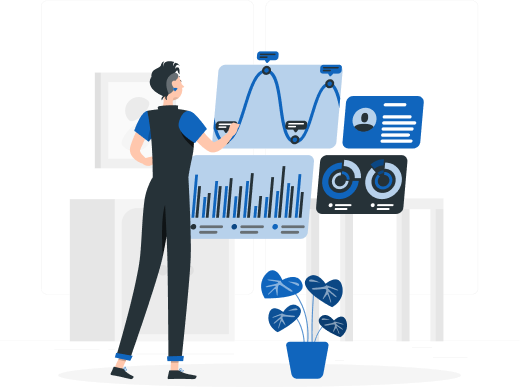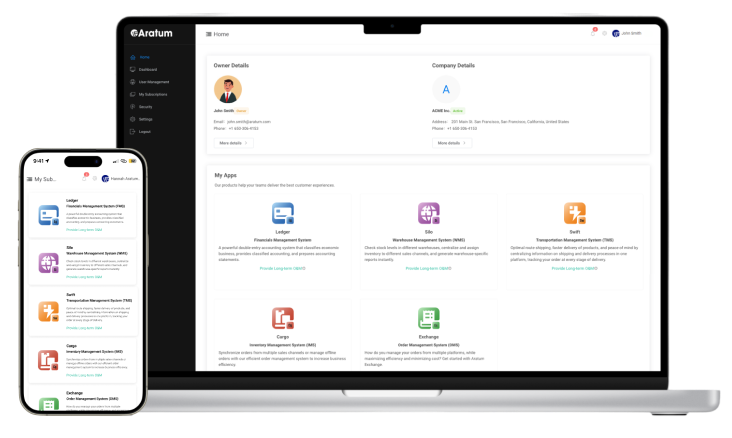E-commerce continues to expand globally, with approximately 2.33 billion individuals shopping online in 2023. Nonetheless, physical stores remain favored. To keep up with the trends, businesses should leverage omnichannel order management to provide their customers with the best of both shopping worlds.
Aratum’s advanced software streamlines your operations through a synchronized system, ensuring your business maintains accurate inventory and high customer satisfaction across all channels.
Unified View Across Channels
Real-Time Inventory Sync
Order Routing and Fulfillment Optimization
Customer Order Visibility
Integrated Returns and Exchanges
Scalability and Flexibility
Analytics and Reporting
Omnichannel order management provides a centralized view of inventory, orders, and customer data across all sales channels (online stores, physical stores, mobile apps, etc.). This unified view ensures consistency and accuracy in managing orders regardless of where they originate.

Unlike traditional order management, which may update inventory periodically, omnichannel systems offer real-time synchronization. This means inventory levels are instantly updated across all channels when a purchase or stock is received.

Omnichannel systems can intelligently route orders to the most optimal fulfillment location based on inventory availability, customer proximity, and shipping costs. This ensures faster delivery times and lower shipping costs.

Customers can track their orders across all stages of fulfillment, from purchase to delivery, regardless of the channel they used to place the order. This transparency enhances customer satisfaction and reduces inquiries to customer support.

Omnichannel order management includes streamlined processes for handling returns and exchanges across all channels. This integration simplifies the returns process for customers and retailers, ensuring consistency and efficiency.

These systems are designed to scale with growing businesses and adapt to changing market conditions and customer expectations. They support multiple currencies, languages, and payment methods, facilitating international expansion.

Omnichannel systems provide advanced analytics and reporting capabilities that offer insights into sales performance, inventory trends, customer behavior, and more. This data-driven approach enables retailers to make informed decisions and optimize operations.

Omnichannel order management integrates online platforms, mobile apps, and physical stores to provide a unified view of inventory and orders and ensure consistent customer experiences across all channels.
Omnichannel order management harmonizes online shopping, brick-and-mortar stores, and mobile apps to streamline inventory visibility and fulfillment, offering customers seamless shopping experiences regardless of how they engage with the brand.
Omnichannel order management enhances efficiency by integrating online pharmacies, physical clinics, and mobile health apps, ensuring accurate inventory management and timely delivery of medications and supplies to patients and healthcare providers.
Omnichannel order management synchronizes online marketplaces, retail stores, and mobile platforms to optimize inventory visibility and fulfillment, ensuring products reach consumers efficiently across various channels.
Omnichannel order management coordinates temperature-controlled logistics across online platforms, distribution centers, and retail outlets to maintain product integrity and ensure timely delivery of perishable goods, meeting stringent quality and safety standards.
Omnichannel order management integrates online ordering portals, physical warehouses, and distributor networks to streamline inventory management and fulfillment processes. This enables efficient bulk sales and timely delivery to retail customers and businesses.
Omnichannel order management optimizes freight booking, warehouse operations, and delivery scheduling across online platforms, distribution hubs, and transport fleets, ensuring seamless coordination and timely fulfillment of shipments for diverse customer demands.
Omnichannel order management integrates production facilities, supplier networks, and online ordering systems to optimize inventory levels, streamline production scheduling, and efficiently fulfill orders across global markets. This ensures responsive customer service and supply chain agility.
Omnichannel order management integrates online ordering systems, specialized storage facilities, and distribution networks to safely and efficiently manage hazardous materials. It ensures compliance with regulatory requirements and meets high safety standards and customer delivery expectations.
Omnichannel order management integrates shipment tracking, warehouse operations, and delivery scheduling across online platforms, freight terminals, and transport networks to optimize handling and ensure timely parcel and container distribution, boosting logistics efficiency and customer satisfaction.

Coming from its humble beginnings as an e-commerce store, a San Franciso-based thrift shop selling curated high-quality corsets and lingerie expanded to include two physical branches in the city. Initially, everything was seamless as they sold unique items, with each product design limited to one.
However, as the business grew, they acquired at least three quantities of some designs, which led to inventory problems. For instance, two corsets sold in the physical store were still listed as available online, causing online buyers to purchase items that were no longer in stock.
The situation unintentionally favored in-store shoppers and resulted in the cancellation of online orders, which frustrated their loyal online customers from outside the city and country.
In response to these challenges, the company sought our omnichannel order management software.
Omnichannel order management integrates various sales channels (online, physical stores, mobile apps) into a unified system to manage orders and inventory seamlessly across all platforms.
Traditional order management typically focuses on individual channels, whereas omnichannel order management ensures a unified view and consistent customer experience across all channels.
Benefits include improved inventory visibility, enhanced customer experience, streamlined order fulfillment, reduced costs through optimized operations, and increased sales due to better availability and customer satisfaction.
It addresses challenges like inventory inaccuracies, disjointed customer experiences across channels, inefficient order fulfillment processes, and difficulty adapting to customer preferences and market demands.
It synchronizes inventory in real-time across all channels, ensuring accurate stock levels and preventing overselling or stockouts.
It provides a consistent shopping experience across channels, including options for in-store pickup, easy returns across any channel, and personalized marketing based on customer behavior data.
Yes, it can handle multiple currencies, languages, and tax regulations, facilitating global expansion and localization of customer experiences.
Centralizing order processing and fulfillment reduces order entry, picking, packing, and shipping errors, leading to higher order accuracy rates.
Important indicators include order fulfillment rates, inventory turnover, customer satisfaction scores, and sales conversion rates across channels.
Businesses can start by evaluating current systems, implementing scalable technology solutions, training staff on new processes, and gradually integrating channels to ensure a smooth transition.
Yes, integration with ERP (Enterprise Resource Planning) and CRM (Customer Relationship Management) systems is essential to manage data across departments and provide a holistic view of operations.

To implement an effective omnichannel order management system in your industry, you can rely on Aratum software solutions tailored to your business requirements to help you get started and gain visibility, efficiency, and resiliency.
Aratum is a globally recognized software provider specializing in developing supply chain management solutions. Our software solutions incorporate advanced algorithms and optimized data structures to facilitate efficient data processing and information dissemination across organizations.
Leveraging cutting-edge technologies such as machine learning and artificial intelligence, the software enables automated decision-making and real-time analytics, enhancing supply chain visibility and improving overall performance.
With a focus on delivering robust and scalable solutions, Aratum is committed to providing our clients with the tools necessary to optimize their supply chain operations and gain a competitive edge in your respective markets.






© 2024 Aratum or an Aratum affiliate company. All rights reserved. No part of this publication may be reproduced or transmitted in any form or for any purpose without the express permission of Aratum or an Aratum affiliate company. The information contained herein may be changed without prior notice. Some software products marketed by Aratum and its distributors contain proprietary software components of other software vendors. National product specifications may vary. These materials are provided by Aratum or an Aratum affiliate company for informational purposes only, without representation or warranty of any kind, and Aratum or its affiliated companies shall not be liable for errors or omissions with respect to the materials. The only warranties for Aratum or Aratum affiliate company products and services are those that are set forth in the express warranty statements accompanying such products and services, if any. Nothing herein should be construed as constituting an additional warranty. In particular, Aratum or its affiliated companies have no obligation to pursue any course of business outlined in this document or any related presentation, or to develop or release any functionality mentioned therein. This document, or any related presentation, and Aratum’s or its affiliated companies’ strategy and possible future developments, products, and/or platforms, directions, and functionality are all subject to change and may be changed by Aratum or its affiliated companies at any time for any reason without notice. The information in this document is not a commitment, promise, or legal obligation to deliver any material, code, or functionality. All forward-looking statements are subject to various risks and uncertainties that could cause actual results to differ materially from expectations. Readers are cautioned not to place undue reliance on these forward-looking statements, and they should not be relied upon in making purchasing decisions. Aratum and other Aratum products and services mentioned herein as well as their respective logos are trademarks or registered trademarks of Aratum (or an Aratum affiliate company) globally. All other product and service names mentioned are the trademarks of their respective companies. See aratum.com for additional trademark information and notices.